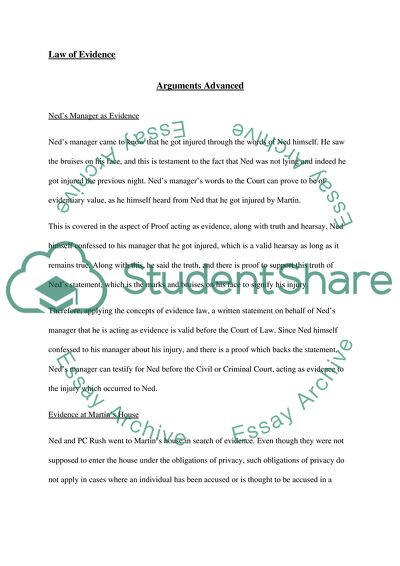
- Home
- Free Samples
- Premium Essays
- Editing Services
- Extra Tools
- Essay Writing Help
- About Us
- Studentshare
- Subjects
- Miscellaneous
- Evidence law
Evidence law - Essay Example
Definition of…

- Subject: Miscellaneous
- Type: Essay
- Level: Undergraduate
- Pages: 4 (1000 words)
- Downloads: 0
- Author: eleonorebeatty
Extract of sample "Evidence law"
Ned’s manager came to know that he got injured through the words of Ned himself. He saw the bruises on his face, and this is testament to the fact that Ned was not lying and indeed he got injured the previous night. Ned’s manager’s words to the Court can prove to be of evidentiary value, as he himself heard from Ned that he got injured by Martin. This is covered in the aspect of Proof acting as evidence, along with truth and hearsay. Ned himself confessed to his manager that he got injured, which is a valid hearsay as long as it remains true.
Along with this, he said the truth, and there is proof to support this truth of Ned’s statement, which is the marks and bruises on his face to signify his injury. Therefore, applying the concepts of evidence law, a written statement on behalf of Ned’s manager that he is acting as evidence is valid before the Court of Law. Since Ned himself confessed to his manager about his injury, and there is a proof which backs the statement, Ned’s manager can testify for Ned before the Civil or Criminal Court, acting as evidence to the injury which occurred to Ned.
Ned and PC Rush went to Martin’s house in search of evidence. Even though they were not supposed to enter the house under the obligations of privacy, such obligations of privacy do not apply in cases where an individual has been accused or is thought to be accused in a crime. Therefore, the entering of PC Rush and Ned into Martin’s house after the incident had occurred, in order to search for evidence is completely justifiable. After entering the house they found a shirt which belonged to Martin, and which had blood stains on it.
After getting the analysis done, it showed that the blood stains were of Ned. This is known as Circumstantial Evidence, which points out in the direction of the Prosecution, to make its case stronger. Circumstantial evidence is evidence in
...Download file to see next pages Read MoreCHECK THESE SAMPLES OF Evidence law
Discussion on Evidence Law
Different Aspects of Evidence Law
Evidence Law - Victoria (Australia) Legal Case Commentary
Criminal Evidence Law - Evidential and Legal Burden
Evidence Law and Practice Critique
Evidence Law Cases Analysis
Evidence Law of Offence
Uniform Evidence Law and Acts

- TERMS & CONDITIONS
- PRIVACY POLICY
- COOKIES POLICY